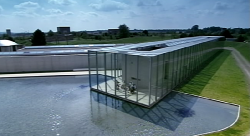 Concert Review: HKPO-Renes-DeYoung-SkeltonSeptember 2, CCCHHKPO-Lawrence Renes-Michelle DeYoung-Stuart SkeltonMozart-Mahler
Concert Review: HKPO-Renes-DeYoung-SkeltonSeptember 2, CCCHHKPO-Lawrence Renes-Michelle DeYoung-Stuart SkeltonMozart-MahlerI have always liked watching upcoming conductors more than tired "maestros", but my first encounter with
Lawrence Renes, former protege of indisposed Edo de Waart and contender for the HKPO job, was a mixed bag. Renes had appeared with the HKPO before in Bruckner, which unfortunately I missed. Coming from the Dutch tradition, he is allegedly well schooled in Mahler and Bruckner.
I was surprised how the first half dragged. It was apparent Renes has good technique and clear direction, but the
Mozart Jupiter sagged under an imposed weight that would more befit its immediate predecessor, the tragic G minor. The pedestrian performance was a curious blend of modern practice (little vibrato) and old sentiment (including slow tempo) that never took flight. Early on in his tenure with the HKPO, EdW had conducted this piece much more effectively (one of his best efforts).
The
Mahler Das Lied von der Erde fared better but was not a complete success. Many of the orchestra's principals were on sabbaticals and their replacements had not quite gelled with the orchestra. The winds remained the perennial Achilles' heel, but overall the orchestral playing was good, loud enough when needed but too cool in temper. Best was
Stuart Skelton, whose heldentenor quality was immediately apparent. I found
Michelle DeYoung curiously lacking. On the surface, she produced some beautiful tones, but her interpretation was perhaps too considered and did not flow. The final movement,
Der Abschied, was fragmentary and failed to resolve the piece.

 CD Recommendation
CD Recommendation
